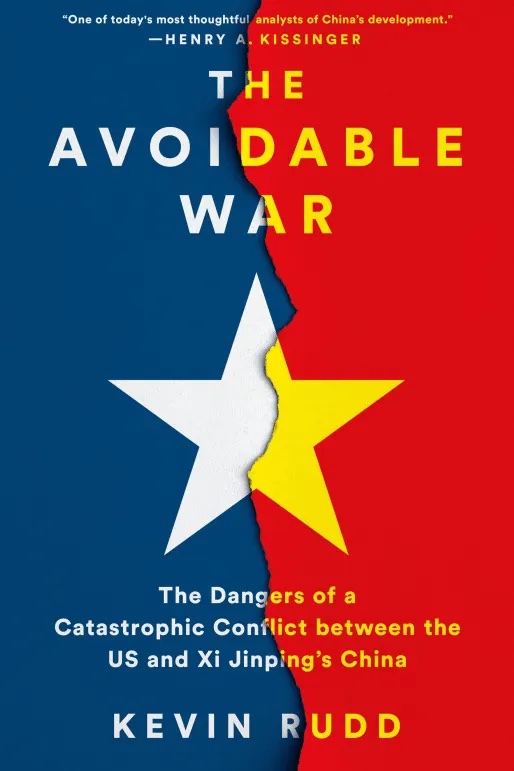
The Avoidable War; The Dangers of a Catastrophic Conflict between the US and Xi Jinping’s China. By Kevin Rudd. Hachette Australia, Sydney 2022.
Reviewed by Tim Coyle PhD
With the 20th National Congress of the Chinese Communist Party (CCP) election of Xi Jinping to an unprecedented, through totally expected, five-year third term as General Secretary, China’s medium to long-term strategy is plain. Ensconced as the most powerful paramount leader since Mao, Xi Jinping Thought is the ruling credo, based on the firm foundation of Marxist-Leninist philosophy with Chinese characteristics. This, in essence, is a brutal face-off between the purity of Marxist-Leninism practised its most highly developed form by the CCP against the dissipated and weak capitalist system of which the United States is the exemplar.
The CCP will continue its march to regional, and global hegemony over the US-led faltering West, will return Taiwan to the motherland and force the US alliance system to collapse leaving regional nations, including Australia, to acquiesce to the CCP.
Think tanks, diplomats, government strategists and military planners are all focused on this epochal period. It is, without doubt, intensely significant for the world.
Kevin Rudd, former Australian prime minister, foreign minister, diplomat, Mandarin linguist and current president of the US-based Asia Society brings his formidable credentials to examining how both sides got to this climactic point and, through what he calls ‘managed strategic competition’, a cataclysmic conflict might be avoided.
Rudd’s stated purpose in writing the book is to explain how the worldviews in China and the United States are pushing the two countries towards war, how it could begin and the world-changing repercussions stemming from it, and what realistic measures could be taken to avoid it.
Managed strategic competition is ‘a framework to manage diplomatic relations, military operations and activities in cyberspace within agreed parameters that would maximise stability, avoid accidental escalation, and make room for both competitive and collaborative dynamics in the relationship’. For this Rudd points to the procedures and mechanisms established between the Soviet Union and the US following the 1962 Cuban crisis. However, instead of teetering on the abyss, establishing agreed security policy limits would allow for competition in the diplomatic, economic and ideological spheres.
Rudd explains managed strategic competition in Chapter 17 – the last chapter. To build up to this solution, he uses the first 13 chapters to analyse the contemporary China/CCP geo-political scenarios under Xi and then turns to the US in chapters 14 to 16.
Beginning with a history of the US-China relationship, he then examines the problems in distrust before launching into Understanding Xi Jinping’s Worldview through ‘Ten Concentric Circles of Interest’. The Circles cover Xi’s strategies for staying in power, securing national unity, economic prosperity, environmental sustainability, military modernisation, managing regional relationships, securing China’s maritime periphery, the Belt and Road Initiative, increasing Chinese world-wide challenges to the Rules-Based Order. Turning to the US, he addresses America’s Emerging Strategic Response to Xi Jinping’s China before returning to China with an examination of The Politics of the Twentieth Party Congress.
The penultimate chapter, The Decade of Living Dangerously: Alternative Futures for US-China Relations, canvasses 10 potential scenarios, based on different assumptions of military contingency outcomes, which could play out by 2030.
Kevin Rudd aims this book at an American readership; however, it is equally appliable to regional and extra-regional countries as any war between the US and China would be catastrophic for the world. The ‘limited’ Russia-Ukraine war has severely affected global resource markets and supply lines; a China-US conflict would magnify these effects exponentially.
The Avoidable War is a masterwork. It should be essential reading for practising diplomats, political and government decision-makers at all levels, military personnel in line appointments and defence colleges, university international and strategic studies faculties; indeed anyone concerned about the world’s future, and particularly Australia’s exposure.



